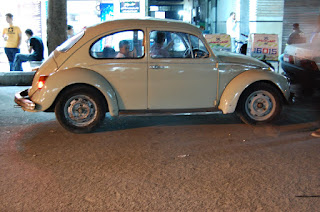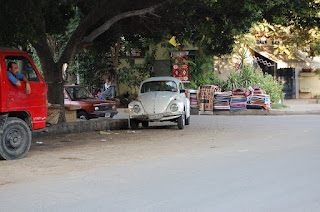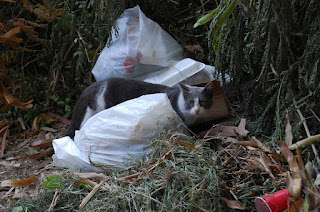Weekend News Roundup
The Weekend News Roundup is a bit lengthy this week. A few Cairo neighborhood pieces; Egypt's water shortage (and crocs); book reviews: one on a book mentioned previously, and others include two about India's Independence, comparing the decision to partition to what is happening in Iraq, with a mention of one of my favorite books, A Peace to End All Peace; then of course the censorship spot (my fave: "Innovative Approach To Censorship" of how a Saudi Sheikh can put the screws to a major British publishing company - I' d like to see him try that in the U.S.,) plus, the usual censorship march in some Middle East countires, and from Putin (I liken him to Darth Vader and his deathly neck pinch); and my newest pet peeve, the recent U.S.wiretapping law. Phew!
Egypt Today Magazine has a section describing all the different neighborhoods of Cairo, including mine Welcome to the ‘Burbs
With all the perks of big city life — but without the noise, congestion and concrete of Mohandiseen — Maadi is a haven for suburbanites.Then there's the commentary in Al-Ahram News about Gated communities, By Salama A Salama.
Luxury real estate is not the answer to our problems. If anything, it will heighten the sense of social injustice and political exclusion that is growing all around us. This new lifestyle can only worsen the situation where political extremism and political oppression combine to destroy the social fabric of our country. We need to have a strategy for investment. We need a strategy that takes into account the social and political repercussions of investment. We cannot let businessmen and contractors tell us how to live.Under the "Book" section, US author offers simplistic, sincere view of Egypt, critiques a book of an expat's view of Cairo, somewhat dissing it since the book's author lived in Maadi. After reading the above commentary and World's Apart, below, I don't think Maadi is that far removed from the rest of Cairo. We're not "gated"; we don't have a golf, tennis, and pool club at our disposal; we do see beggars - mothers with infants begging for money for food (putting their pursed hands up to their mouths); we have continual brownouts and blackouts; but fortunately, so far, we've been lucky with the water situation (except in February when the Metro flooded); and we do have access to the Metro. We may be a "suburb" but in the States we'd be called an "inner ring suburb" meaning that we are just a step outside the "inner city." The next article describes the differences in how the rich and poor have been dealing with the recent water shortage currently going on here in Egypt, Worlds apart
Residents of Daqahliya fought each other with sticks and stones to fill their water containers last week in scenes which, say the residents of one village, grow increasingly chaotic as the water shortage drags on.
A world away, in Qatamiya Heights, one of Cairo's many new up-market suburbs, residents were upset when water began to trickle from their taps. Then it was cut completely. But unlike the villages in Daqahliya water did not need to be trucked in. Instead residents headed for the supermarkets, buying box after box of bottled water. Maged Raouf, who has just moved into the area, has sent his children to stay at a relative's house until the water returns. "I can't possibly continue to pay this much for bottled water every time I have a shower". The facilities at his gym, he says, have become his de facto bathroom for the time being.
And, in Only in Egypt! a rather unfortunate result of the water shortage.
CAIRO -- A regularly updated collection of weird and whacky news items from Egypt.
Morning shower soils employee's reputation
EGYPT'S RELENTLESS summer heat and water shortages recently proved too hot to handle for one hapless, hygiene-conscious employee.
A 27-year-old man whose un-air-conditioned home's water supply was often erratic, making bathing a rare luxury, had made it a habit of reaching his work premises early in the morning, so as to avail himself of the on-site showers.
However, on one such occasion, while enjoying a refreshing soap-and-lather, the man realized he had left some other bath essentials in his work desk. Hoping to grab them and return unnoticed to complete his wash, he set forth frothy-but-otherwise-unadorned on his quest.
Unfortunately for the would-be bather, his boss had opted for an early start that morning, too, and was not amused to see his nude employee fumbling for bath oils in the middle of the office space.
The employee was docked five days wages from his total salary, and an official investigation into the affair was ordered by his superior. (Al Ahram)
BOOKS:
Against the Current
By LISA FUGARD
Published: August 5, 2007
In 1998, Rosemary Mahoney set out to row the Nile on her own.FIRST CHAPTER
Mahoney rows from Aswan to Edfu — a three-day journey — in Amr’s boat with Amr following in his felucca. She then takes a taxi to Luxor, where mobs of Europeans soak up the sun in skimpy attire and young Egyptian men work as gigolos. The inevitable conversations about sex — with Ahmed, a male prostitute, and Adel, a lawyer — are surreal, lurid and terribly sad. The freedom of being able to talk to a Western woman in an open way soon dissipates, and we see men who are frustrated and bored, struggling against the strictures of Islamic culture.
‘Down the Nile’
“[T]hough in Egypt the assumption of the veil at puberty was officially a matter of individual choice, many Egyptian women wore the hijab . . .”
What also discredits some of her remarks is that she lived the Cairo's Maadi neighborhood, where a lot of Westerners isolate themselves. Indeed, many of them find it similar to Washington, DC - an observation Eck, herself, makes. This limits the reader to seeing only one of Egypt's many faces, whereas the book aims to cover Egyptian society in its entirety.
Many Westerners in Egypt, or "expats," as Eck calls them, don't move around a lot, let alone socialize, outside Maadi. They live in a Western community in a Westernized neighborhood, as if they had brought the West with them to Egypt. This, in turn, keeps them from experiencing true Egyptian society and culture, and this was a defect in the memoir. Eck mainly concentrates on her life in Maadi, where she spent most of her stay, outside of a few months in Alexandria.
Nonetheless, from her Maadi base, Eck still offers valuable insight into the "expat" community she mingled with: "Expat women lead interesting lives. Since most have young children, they do volunteer work, ride, go out to lunch, shop, and take golf lessons while their children are in school ... Some [expat] women have their own car and driver. Everyone seems to have a maid at least three times per week. Others have a nanny and/or a cook. If they live in a villa rather than an apartment, they may have a gardener, and their own security guards or bawwab."
The Man in the White Sharkskin Suit
By MICHIKO KAKUTANI
Published: August 10, 2007
In this stunning memoir, Ms. Lagnado gives us a deeply affecting portrait of her family and its journey from wartime Cairo to the New World.
In “The Man in the White Sharkskin Suit” Ms. Lagnado — an investigative reporter at The Wall Street Journal — gives us a deeply affecting portrait of her family and its journey from wartime Cairo to the New World. Like André Aciman in his now classic memoir, “Out of Egypt” (1994), she conjures a vanished world with elegiac ardor and uncommon grace, and like Mr. Aciman she calculates the emotional costs of exile with an unsentimental but forgiving eye. This is not simply the story of a well-to-do family’s loss of its home, its privileges and its identity. It is a story about how exile indelibly shapes people’s views of the world, a story about the mathematics of familial love and the wages of memory and time.
FIRST CHAPTER“On the first Thursday night of every month . . . Om Kalsoum, the Nightingale of the Nile, the greatest singer Egypt had ever known, broadcast live from a theater in the Ezbekeya section . . .”
EXIT WOUNDS
The legacy of Indian partition.
by Pankaj MishraIn the nineteen-twenties and thirties, Churchill had been loudest among the reactionaries who were determined not to lose India, “the jewel in the crown,” and, as Prime Minister during the Second World War, he tried every tactic to thwart Indian independence. “I hate Indians,” he declared. “They are a beastly people with a beastly religion.” He had a special animus for Gandhi, describing him as a “rascal” and a “half-naked” “fakir.” (In a letter to Churchill, Gandhi took the latter as a compliment, claiming that he was striving for even greater renunciation.) According to his own Secretary of State for India, Leopold Amery, Churchill knew “as much of the Indian problem as George III did of the American colonies.”
Remembering PartitionThe parallels with contemporary Iraq are far from exact. The British Empire ruled India for nearly a century and, at the end, drew the boundaries that spawned decades of conflict; they should have felt an obligation to keep the place from collapsing before they departed. India was also a real country before the British colonized it, whereas Iraq was a colonial contrivance from the outset. (For the amazing story of how the British invented Iraq, and messed up the Middle East for all time to boot, see David Fromkin's A Peace To End All Peace.)
MUSLIMS IN AMERICA:
American Muslims Reimagined
Why comics? "I love the medium." Wilson responds. "I can't say enough good things about it. I call it 'the beautiful medium' because it's the only genre of storytelling in which the past, present and future are available to the reader as one image--I make use of that in Cairo, a novel about five very disparate characters and a genie whose stories are interwoven against the backdrop of modern-day Cairo. Outsiders is more overtly political of the two, because it deals with the hotly contested Transboundary Aquifer System in the northern Sahara."
Universities Install Footbaths to Benefit Muslims, and Not Everyone Is Pleased
By TAMAR LEWIN
Published: August 7, 2007
As the nation’s Muslim population grows, issues of religious accommodation are becoming more common, and more complicated.
Nationwide, more than a dozen universities have footbaths, many installed in new buildings. On some campuses, like George Mason University in Virginia, and Eastern Michigan University in Ypsilanti, Mich., there was no outcry. At Eastern Michigan, even some Muslim students were surprised by the appearance of the footbath — a single spigot delivering 45 seconds of water — in a partitioned corner of the restroom in the new student union.
“My sister told me about it, and I didn’t believe it,” said Najla Malaibari, a graduate student at Eastern Michigan. “I was, ‘No way,’ and she said, ‘Yeah, go crazy.’ It really is convenient.”
TRAVEL / PETS:
Think Your Dog Is Smart? Its Collar May Be Even Smarter
By ANNE EISENBERG
Published: August 5, 2007
Collars with Global Positioning System units, motion sensors or other additions help owners keep track of their pets the high-tech way.
EGYPT:
Gone crocodile hunting on the Nile
The Egyptian media is abuzz over a rare reptile sighting in Cairo. Our reporter joins the chase.
By Jill Carroll
Word is, the crocodile – or alligator – has swum downstream to the northern Cairo neighborhood of Maadi.
OIL:
Ghana aims to avoid the 'oil curse'
"
What most people don't understand about oil is that, not only does the money not filter through to the majority of the population, but it's much worse than that," says Nicholas Shaxson, an oil analyst at the London-based Chatham House think tank and the author of "Poisoned Wells," which examines how the resource affects countries. "It actively makes most people poorer."
Why 'peak oil' may soon pique your interest
World oil production peaked in 2005, says one expert, and that presents serious problems in the future
For years, many in the oil industry viewed the peak oil forecasts by Simmons as odd. Now his position has a lot of company. Several websites publish sophisticated material on the issue. There's the Oil Drum (www.theoildrum.com), featuring "Prof. Goose" and "Gail the Actuary." Those pseudonyms hide a full professor at Colorado State University and an actuary in an Atlanta suburb. There's also the Energy Bulletin (www.energybulletin.net). The site's coeditor, Bart Anderson, say it receives 11,000 visits a day. Peak oil enthusiasts, he says, have now divided into a majority seeing life after an oil crunch and those he calls "doomers."
In Britain, Douglas Low, director of the Oil Depletion Analysis Centre (www.odac-info.org), foresees a "crisis coming up" with a real shortage of oil. In June, he notes, the world used 1.5 MB/D more crude than it produced. He expects much higher oil prices in the future.
CENSORSHIP:
Mr. Know-It-All: Bannable Blog Behavior, Scam Bait, MySpace Geezers
Is it OK to ban someone from posting comments on my blog?
Innovative Approach to Censorship
Imagine this scenario. Two reputable American scholars write a book about how certain ostensibly charitable organizations are financial pass-throughs for radical terrorist groups. The book, which is amply documented, is published by a major academic press in Great Britain. Soon after the book appears, a wealthy Saudi sheik sues the publisher (not the authors) for libel. The publisher, evidently fearful of the cost and burden of litigation, promptly announces that it is withdrawing the book from circulation. It requests that all copies of the book be returned by booksellers and libraries so that the book may be pulped, destroyed, never read by anyone. The publisher issues a statement of apology, acknowledging serious (but undefined) errors in the book, and makes a financial award to the sheik, who pledges to give the money to UNICEF (the sheik is a multi-billionaire).
Syria To Crackdown Tougher On Web Sites
Already, Damascus has stopped blogspot from being used in the country and plans on making it difficult for users to have comments pages on their blogs.
"It is hard to believe that Syria would want to close down all websites with comment sections. Already all Blogspot blogs have been blocked in Syria. They can still be read through Bloglines or any other RSS feed, but the comment sections are not so easily accessed," Joshua Landis, Co-director at the Center of Peace Studies, University of Oklahoma, wrote on his blog.
Iranian journalist sentenced to death in closed trial
MEXICO: Journalist shot and wounded after corruption reports
Abuses Belie China Pledge on Rights, Critics Say
Iran: Another Reformist Paper Closed
Russia stretches 'extremism' laws
For example, any speech deemed "extremist" that occurs during a broadcast can lead to a media outlet being warned, and then shut down, by authorities. "The practical outcome of this rule is that radio and TV stations will simply stop having live debate and talk shows," says Dickmann.
Russia: Top Court Upholds Ban on Party
By JOSHUA YAFFA
Published: August 8, 2007
The Supreme Court upheld the Moscow City Court’s ban of the National Bolshevik Party as an extremist organization. The small fringe party has gained notoriety for its vocal and theatrical antigovernment demonstrations. The group’s leader, the writer Eduard Limonov, said in a telephone interview that he did not expect the latest ruling to affect its activities, including participation in the Other Russia coalition, a loose movement of anti-Kremlin forces that includes the former chess champion Garry Kasparov. “They will not shut us up,” Mr. Limonov said. “We have no fear.” He said the party would appeal the ruling to the European Court of Human Rights.
A Gateway for Hackers
The Security Threat in the New Wiretapping Law
U.S. communications technology is fragile and easily penetrated. While advanced, it is not decades ahead of that of our friends or our rivals. Compounding the issue is a key facet of modern systems design: Intercept capabilities are likely to be managed remotely, and vulnerabilities are as likely to be global as local. In simplifying wiretapping for U.S. intelligence, we provide a target for foreign intelligence agencies and possibly rogue hackers. Break into one service, and you get broad access to U.S. communications.
AT&T Tells Court That Secret Wiretapping Destroys Privacy (in 1927)
The function of a telephone system in our modern economy is, so far as reasonably practicable, to enable any two persons at a distance to converse privately with each other as they might do if both were personally present in the privacy of the home or office of either one. […]
The wire tapper destroys this privacy. He invades the "person" of the citizen, and his "house," secretly and without warrant.[…]
[…]It is better that a few criminal escape than that the privacies of life of all the people be exposed to the agents of the government, who will act at their own discretion, the honest and the dishonest, unauthorized and unrestrained by the courts.





























